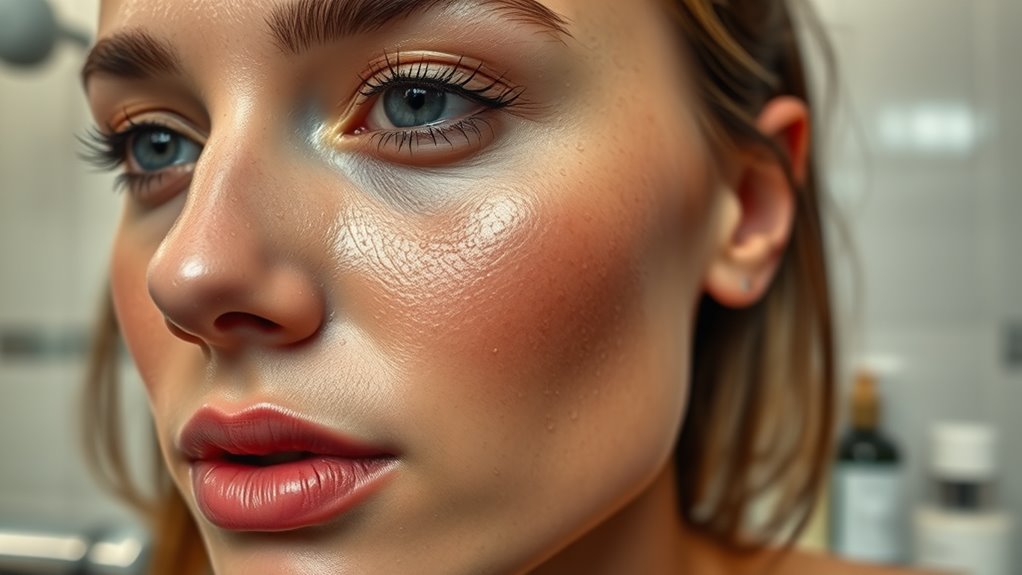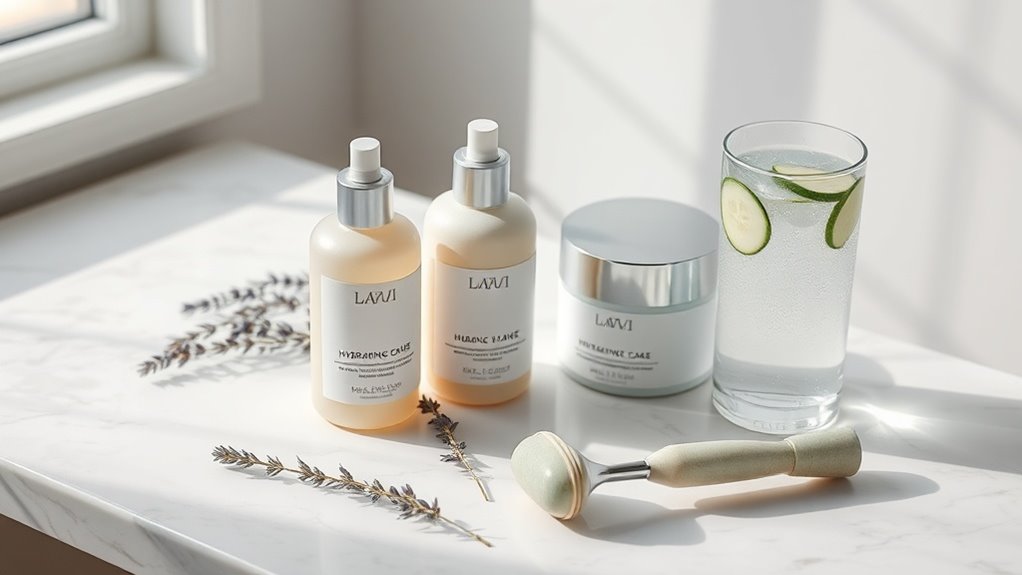Your Oily Skin Could Be Dehydrated – Here’s How to Tell
If you have oily skin, you might be surprised to learn that it can also be dehydrated. This condition often leads to a shiny appearance, but underlying signs may indicate a lack of moisture. Recognizing these signs is crucial for maintaining skin health and balance. So, how can you tell if your oily skin is actually dehydrated? Let’s explore the common indicators and what you can do about them.
Key Takeaways
- Look for flaky patches or rough texture on your skin surface, indicating dehydration despite oiliness.
- A dull complexion can signal dehydration, even when your skin appears shiny and oily.
- Increased sensitivity or a tight sensation in your skin after cleansing can suggest dehydration.
- If your skin feels itchy or stings after washing, it may be dehydrated and in need of moisture.
- Monitoring environmental factors and product ingredients can help identify potential causes of dehydration in oily skin.
Understanding Oily Skin vs. Dehydrated Skin
Oily skin is characterized by excess sebum production, often resulting in a shiny appearance, enlarged pores, and potential acne.
In contrast, dehydrated skin lacks moisture, which can occur even in oily skin types.
Dehydrated skin lacks moisture, and this condition can affect even those with oily skin types.
Dehydrated oily skin may feel tight, appear dull, or show fine lines despite a shiny surface.
It’s crucial to recognize that oily skin can still be dehydrated, leading to a compromised skin barrier.
Assessing your skin’s texture and hydration levels is essential for effective treatment and maintaining overall skin health.
Understanding these differences is key to proper care. Additionally, it’s important to note that hydration is vital for all skin types, including oily skin, to prevent overproduction of oil as a compensatory mechanism.
Common Signs of Dehydrated Oily Skin
Recognizing the signs of dehydrated oily skin is vital for effective skincare. You may notice a combination of excess oil and dryness, leading to confusion. Common signs include:
| Visible Signs | Feelings |
|————————–|—————————|
| Flaky patches | Tightness |
| Dull complexion | Itchiness |
| Increased sensitivity | Stinging after cleansing |
These symptoms indicate that your skin lacks moisture despite its oily nature. Addressing these signs early can help restore balance and improve overall skin health. Pay attention to your skin’s needs for the best results. It’s important to remember that maintaining balance is key in managing oily skin effectively.
The Role of Moisture in Oily Skin
While oily skin often leads to the misconception that it doesn’t require hydration, maintaining adequate moisture is crucial for its health.
Proper moisture levels help regulate oil production, preventing excess sebum that can lead to clogged pores and breakouts.
Hydrated skin also supports the skin barrier, enhancing its ability to retain moisture and protect against environmental stressors.
Incorporating lightweight, non-comedogenic moisturizers can balance your skin’s hydration without adding extra oil. Additionally, managing oily skin effectively can enhance your overall complexion and prevent common skin issues.
Identifying the Causes of Dehydration
Oily skin can still experience dehydration, and identifying the underlying causes is vital for effective treatment.
Factors such as environmental conditions, like low humidity or harsh winds, can strip moisture from your skin.
Over-cleansing with strong soaps may disrupt your skin’s natural barrier, leading to dehydration. Additionally, over-cleansing your skin can result in the stripping away of essential moisture which worsens the problem.
Insufficient water intake and a lack of nourishing ingredients in skincare products can exacerbate the issue.
Hormonal fluctuations, stress, and certain medications can also contribute to dehydrated skin.
Effective Solutions for Balancing Oily and Dehydrated Skin
How can you effectively balance oily and dehydrated skin?
Start by incorporating these solutions into your routine:
-
Use a gentle, hydrating cleanser to avoid stripping moisture.
-
Apply a lightweight, oil-free moisturizer to hydrate without clogging pores.
-
Incorporate hyaluronic acid to boost hydration levels.
-
Opt for non-comedogenic sunscreen to protect without adding excess oil.
-
Exfoliate regularly with chemical exfoliants to remove dead skin cells and improve product absorption.
Additionally, it’s crucial to recognize that avoiding mistakes in your skincare routine can lead to healthier, more balanced skin.
Implementing these strategies can help you maintain a healthy balance, ensuring your skin remains hydrated while controlling excess oil production.
Your skin will thank you for it!
Skin Care Tips to Prevent Dehydration
Maintaining hydration is vital to prevent skin from becoming dehydrated, even if it’s oily. To achieve this, consider the following tips:
| Tip | Action | Frequency |
|———————–|——————————–|————–|
| Drink Water | Consume at least 8 glasses | Daily |
| Use Humidifier | Add moisture to the air | As needed |
| Apply Hydrating Serum | Choose a lightweight formula | Morning & Night |
These practices can help retain moisture in your skin, balancing oil levels effectively. Remember, consistent hydration is crucial for healthy skin, regardless of its natural oiliness. Additionally, avoiding products that strip your skin of its natural oils can prevent tight, dry skin and promote a more balanced complexion.




